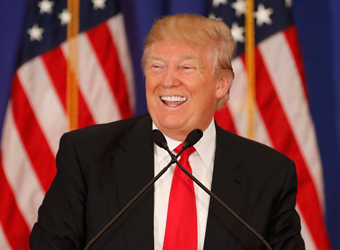Donald Trump’s dispute with China over Taiwan has refocused attention on his combative approach to Beijing.
The president-elect upset almost 40 years of US practice in the region by taking a call from the Taiwanese leader Tsai Ing-wen.
It was an unprecedented breach of the protocol that undergirds the One China Policy, which says Taiwan is part of China and not an independent country.
And it raised questions about whether Mr Trump would follow through on campaign pledges to take a tougher line with Beijing.
China has identified Taiwan as its most important core interest. Since the Kuomintang retreated to the island in 1949 following defeat in the civil war, China has insisted Taiwan is a renegade province that will eventually be reunited with the mainland.
In 1979 the US agreed to go along with this approach, deciding to recognise Beijing instead of Taipei. The One China Policy remains the foundation of that relationship.
Given what’s at stake some China experts and politicians have suggested that Donald Trump blundered unknowingly on to sensitive territory with his penchant for improvised diplomacy.
“I don’t think there was any strategy behind it and I think the effort to push out a story line or a narrative that this was actually a well-thought-about change in direction is highly dubious,” the top Democrat on the House Intelligence Committee, Adam Schiff, told the BBC, saying conflicting accounts made the exchange sound haphazard.
Mr Trump and his Vice President-elect Michael Pence did initially downplay the conversation as a courtesy call initiated by Taiwan that was not about policy.
But numerous reports since have detailed the influence of China hawks and Taiwan proponents amongst his advisors who arranged the call.
And then Mr Trump followed up with a flurry of tweets criticising Beijing’s economic and security practices, showing no remorse and making no gestures to reaffirm the One China Policy.
“I think it was prearranged and deliberate and Donald Trump knew what it was about,” says Walter Lohman, Director of Asian Studies at the conservative Heritage Foundation.
So what was it about? In and of itself, the call is not a policy shift.
The One China agreement doesn’t specifically prohibit contact between American and Taiwanese leaders, although past US presidents have refrained from picking up the phone so as not to upset China.
And right from 1979, there was criticism in Washington over US treatment of Taiwan, says Robert Daly, Director for the Kissinger Institute on China at the Woodrow Wilson Center.
That’s especially so among Republicans, who have longstanding personal and in some cases business ties with the democratic country that seems a more like-minded ally than Beijing.
The talk among Mr Trump’s advisers is not about recognising Taiwan, but regularising the way the US interacts with it, says Mr Lohman, which does not mean overturning the One China Policy.
It’s doubtful Beijing would see it that way.
As for President-elect Trump, there is no policy yet on Taiwan, or on China more broadly – or even a discernible strategy.
But there has been extraordinarily fiery campaign rhetoric.
As a candidate, Mr Trump accused Beijing of “raping” the United States with its trade policies and threatened to levy a punishing tariff on Chinese goods.
Hard-line Republicans have welcomed the Taiwan telephone call as evidence that Mr Trump the president would continue confronting China.
“He showed the dictators in Beijing that he’s not a pushover,” Representative Dana Rohrabacher told Fox News.
Others have suggested that the president-elect wants to use Taiwan as a bargaining chip for a better economic deal.
‘This whole idea of finding ways to strengthen and increase the level of contact with and support for Taiwan is not only sure to drive China crazy, but at the same time give us some leverage over China,” says Patrick Cronin at the Center for New American Security.
“Because this could become the new normal if we’re not happy with the overall relationship.”
Thus far, China has been fairly restrained, blaming Tsai Ing-wen for a “petty trick”.
The response to the Twitter tirade was tougher – an editorial in the official People’s Daily warned that “creating troubles for the China-US relationship is creating troubles for the US itself.”
But Beijing still left diplomatic space to formulate a new relationship with the Trump administration.
Robert Daly predicts a long adjustment period with a more adversarial tone, because the incoming administration appears to see the relationship as fundamentally competitive.
That would potentially leave less room for the kind of co-operation President Obama emphasised on global issues such as climate change, and containing North Korea’s nuclear militarisation.
“The people advising Trump on Taiwan were pleased with the results (of the call),” Mr Daly says. “That likely means similar actions going forward.”
Still, there are many ways China could respond to further provocations.
And it would respond, says Meredith Sumpter of the Eurasiagroup, “in a direct and probably proportional way, but one that hurts US business and commercial interests”.
Economically, a lot of trade and investment is at stake.
When it comes to security issues, Beijing could decide to be more or less aggressive on disputes in the South China Sea and on North Korea sanctions.
And it has never dropped its threat of force to settle the status of Taiwan, so the Taiwanese people could end up paying the biggest price.
One test of relations could come next month when Ms Tsai is expected to transit through the US on her way to Central America.
Her office has denied reports that she will try to meet Mr Trump’s transition team.
Another could arise in April when the Treasury Department is set to publish a “currency” report that might prompt Mr Trump to act on his threats to label China a currency manipulator.
Source: BBC


